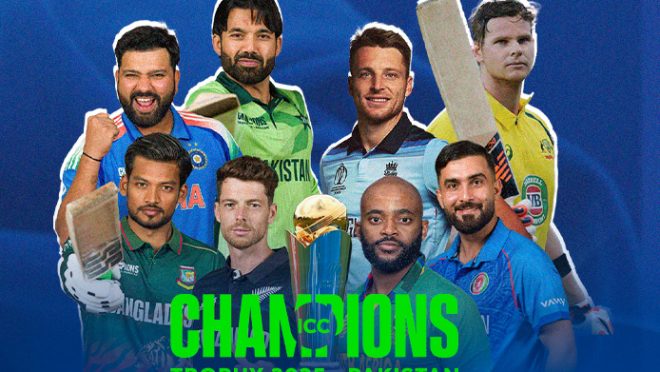ICC Champions Trophy 2025 set to kick off today
ICC Champions Trophy 2025 set to kick off today

The ICC Champions Trophy 2025, scheduled from 19 February to 9 March, marks the return of this prestigious ODI tournament after an eight-year hiatus. Hosted by Pakistan, with India’s matches set in Dubai due to political considerations, the tournament features eight top cricketing nations divided into two groups.
Group A:
Pakistan: As the host nation and defending champions, Pakistan enters the tournament with high expectations. Their historic victory in the 2017 Champions Trophy, where they defeated arch-rivals India by 180 runs in the final, remains a significant achievement. Wicketkeeper-batsman Mohammad Rizwan leads the team, marking his first captaincy in an ICC event. The squad boasts experienced players such as Babar Azam and Shaheen Shah Afridi, providing a balanced mix of batting prowess and bowling strength. Interim coach Aaqib Javed brings a wealth of experience to the coaching staff. Pakistan’s group stage matches are scheduled across Karachi and Rawalpindi, with the much-anticipated clash against India set for 23 February in Dubai.
India: India, a two-time Champions Trophy winner (2002, 2013), aims to reclaim the title under the leadership of Rohit Sharma. Shubman Gill has been appointed vice-captain, reflecting his rising stature in international cricket. The squad sees the return of key players Jasprit Bumrah and Kuldeep Yadav from injuries, bolstering both the pace and spin departments. Wicketkeeper Rishabh Pant also makes a comeback, adding depth to the batting line-up. Due to political tensions, all of India’s matches, including the high-profile encounter against Pakistan, will be held in Dubai. The team is coached by Gautam Gambhir, a former opener known for his tactical acumen.
New Zealand: The Black Caps, known for their consistency in ICC tournaments, are led by all-rounder Mitchell Santner in his maiden ICC event as captain. Veterans such as Kane Williamson and Tom Latham provide stability to the batting order, while pacers Lockie Ferguson and Matt Henry spearhead the bowling attack. New Zealand’s only Champions Trophy triumph came in 2000, and they are keen to add another title to their cabinet. Gary Stead continues as head coach, bringing strategic insight to the team’s campaign. Their group stage fixtures include matches against Pakistan, India, and Bangladesh, with venues spanning Karachi, Rawalpindi, and Dubai.
Bangladesh: Under the captaincy of Nazmul Hossain Shanto, Bangladesh aims to replicate or surpass their 2017 performance, where they reached the semi-finals. The squad features seasoned players such as Mushfiqur Rahim and Mahmudullah, providing experience in the middle order. Notably, all-rounder Shakib Al Hasan has been excluded from the squad due to a suspension from bowling. Phil Simmons serves as head coach, tasked with guiding the team through a challenging group stage. Bangladesh’s matches are scheduled in Dubai and Rawalpindi, facing formidable opponents in India, New Zealand, and Pakistan.
Group B:
Australia: Australia, aiming to secure their third Champions Trophy title (previous wins in 2006 and 2009), faces challenges with the absence of key players due to injuries and personal reasons. Steve Smith has been named captain, stepping in for Pat Cummins, who is unavailable for the tournament. The squad includes experienced campaigners such as Glenn Maxwell and Adam Zampa, alongside newcomers eager to make their mark. Andrew McDonald serves as head coach, overseeing a team in transition. Australia’s campaign kicks off against England on 22 February in Lahore, with subsequent matches against South Africa and Afghanistan.
England: Jos Buttler continues to lead England’s white-ball squad, with Brendon McCullum at the helm as the all-format head coach. The team aims to bounce back from recent setbacks, including a challenging tour of India. The squad features a blend of experienced players such as Joe Root and emerging talents such as Harry Brook, who has been named vice-captain for the white-ball formats. England’s previous best performances in the Champions Trophy were as runners-up in 2004 and 2013, and they are determined to clinch their maiden title this year. Their group stage matches are slated against Australia, South Africa, and Afghanistan, with venues including Lahore and Karachi.
South Africa: The Proteas, led by Temba Bavuma, are in pursuit of their first ICC trophy since their inaugural Champions Trophy win in 1998. The squad boasts a strong bowling line-up featuring Kagiso Rabada and Lungi Ngidi, complemented by dynamic batsmen such as Aiden Markram and David Miller. Head coach Rob Walter brings a fresh perspective, aiming to guide South Africa beyond their traditional ‘chokers’ tag in ICC events. Their group stage encounters include matches against Afghanistan, Australia, and England, with fixtures set in Karachi and Rawalpindi.
Afghanistan: Making their Champions Trophy debut, Afghanistan is led by Hashmatullah Shahidi. The team has shown significant progress in international cricket, with players such as Rashid Khan and Mohammad Nabi bringing invaluable experience. Former Pakistan captain Younis Khan has been appointed as the team mentor, offering insights particularly beneficial given his familiarity with local conditions. Jonathan Trott continues as head coach, focusing on harnessing the team’s potential to cause upsets in the tournament. Afghanistan’s matches are scheduled in Karachi.


